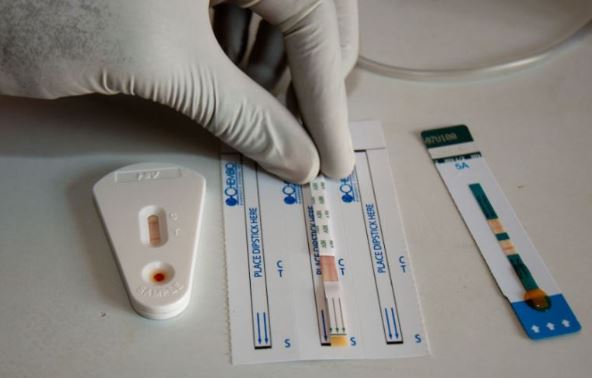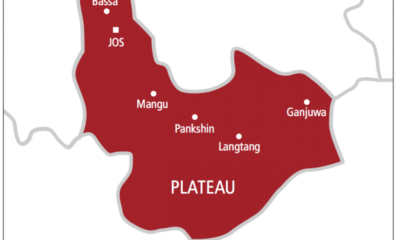News
N70,000 HIV prevention injection splits Nigerians

A twice-yearly Human Immunodeficiency Virus prevention injection, hailed as the most promising tool against the virus in decades, has generated mixed reactions among Nigerians following reports that it may soon be available at about $40 (less than N70,000) per patient per year.
The drug, known as lenacapavir, is currently marketed in the United States as Yeztugo by Gilead Sciences at a prohibitive cost of over $28,000 annually, Sunday PUNCH gathered.
However, a new initiative involving Indian pharmaceutical giants Hetero Labs Ltd. and Dr Reddy’s Laboratories, alongside global partners such as the Gates Foundation, Unitaid, the Clinton Health Access Initiative and Wits RHI, aims to roll out affordable generic versions across resource-limited countries, including those in Africa.
This is expected to happen in the coming weeks, according to reports by Reuters and The Guardian UK.
Unlike daily pre-exposure prophylaxis (also called PrEP) pills, lenacapavir requires just two injections a year, each offering six months of protection.
Experts have described this durability as “transformational,” particularly for women who struggle with daily medication or face difficulties negotiating condom use.
Former United States President Bill Clinton said the breakthrough could “change lives,” highlighting the significance of protecting someone for half a year at the cost of existing PrEP pills.
Global health projections suggest that even a modest rollout in high-burden countries could cut new HIV infections by as much as 20 per cent.
Yet, amid the excitement, scepticism runs deep.
A man living in Port Harcourt, who wanted to be identified only as Tobe, said he was sceptical about the injection.
Tobe, who works as a fuel attendant, said he was uncomfortable with the idea of being injected with a medication to prevent him from contracting HIV.
“How can an injection taken only twice yearly replace PrePs taken every day for 365 days? It’s just so hard to believe,” he said.
A student at the Federal University of Technology, Owerri, said he would stick with the PreP option.
On social media platforms, the announcement of the drug’s affordability stirred a flurry of conspiracy theories and mistrust.
Comments ranged from suspicion about hidden agendas to outright rejection.
One user on Instagram, Doantus Godwin, wrote, “I don’t want to talk about the effects of the COVID vaccine I took. My health has become something else since then. I can tell you for free not to ever catch the virus, not to talk about taking that vaccine.
“Na to kill our fertility rate this man dey find.” Another added, “Watch fertility rate drop drastically and erectile dysfunction high. I don’t trust them.”
Others linked the initiative to population control plots allegedly backed by Western figures. “The target is fertility. They will not give you anything without taking from you. Good luck to everyone,” one comment read.
Some argued that the intervention was unnecessary when abstinence, condoms and antiretroviral therapy were already available.
“What happened to abstinence, condoms and ARVs? Must they inject us with something?” a user asked.
A few, however, welcomed the development, pointing to the potential benefits in reducing the spread of the virus.
A renowned public health researcher and former senior researcher at the Nigerian Institute of Medical Research, Dr Dan Onwujekwe, in an interview with Sunday PUNCH, countered talk of ulterior motives.
He said he was more concerned about the rollout, accessibility and affordability of the medication for HIV prevention.
“Taking that medication twice a year will clearly improve adherence. A lot of people are worried about taking PrEp for life. Most people don’t want to be seen taking that medication because they feel they will be stigmatised.
“Those who can afford it should go for it. I don’t think it should be rolled out as a free treatment for everyone.
“People are always pushing forward these fears. That is not the issue with this development. A lot of people say these things without clear intentions. This new development is part of progress.
“God bless this man (Bill Gates). Hated by so many for no reason,” one user, Philomena Davies, wrote, countering the tide of suspicion.(Punch)
-

 Politics23 hours ago
Politics23 hours agoTwo Taraba senators defect to APC, raising party’s seats to 81
-

 Politics23 hours ago
Politics23 hours agoSenate Begins Consideration Of Electoral Bill
-

 News17 hours ago
News17 hours agoSenate Passes Electoral Act Amendment Bill
-

 Sports22 hours ago
Sports22 hours agoNigeria hasn’t qualified for World Cup since I left office — Dalung
-

 Politics17 hours ago
Politics17 hours agoQuit partisan politics – Adamawa Rep advises Atiku
-

 News17 hours ago
News17 hours agoNnamdi Kanu appeals conviction, faults terrorism trial
-

 News23 hours ago
News23 hours agoResidents Flee As Bandits Kill Soldier, Loot Plateau Community
-

 Metro23 hours ago
Metro23 hours agoOBITUARY: Ron Kenoly, nightclub singer turned worship leader who adopted Nigerian name ‘Chukwuemeka’
















